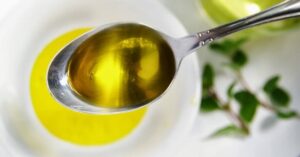Nutritionists and professionals in the sector express themselves very clearly regarding the use of extra virgin olive oil as the main condiment in slimming or low-calorie diets.
Reduce it? Sure, it’s possible. Eliminate it altogether? Never.
Yes, because the beneficial properties, nutritional values and calories of extra virgin olive oil, all together play a very important role in our health.
In fact, even if in the food pyramid extra virgin olive oil actually falls into the category of fats, it is one of the most precious foods; it is impossible to even think of drawing up a food plan that does not allow its use, however restrictive this diet may be.
Olive oil is rich in nutrients and, despite its high caloric intake, it’s also rich in meny essential elements for the correct human functioning. Among the many we remember: vitamin E, polyphenols, oleic acid and mono/polysaturated fats.
But, if extra virgin olive oil is so good for you, why are so many consumers still mistakenly influenced by its calories?
Well…
But really, how many calories does extra virgin olive oil have?
Let’s understand together how to regulate ourselves with the use of extra virgin olive oil as a condiment, so as not to give up the pleasure of using a key product of the Mediterranean diet, even if there is a need to cut on calories.

100 grams of olive oil bring 899 kilocalories, which in its entirety are supplied by lipids, or monounsaturated fatty acids rich in healthy properties. In a simpler way, if we talk about the basic diet, the unit of measurement is the spoon (about 10 g – a teaspoon of extra virgin olive oil will be half), then the calories will amount to 90. But, as we have already mentioned, the same spoon of oil does not contain only calories but many other precious substances; among those already described we can add that extra virgin olive oil is our friend even in the case of hypocholesterolemic: that is, it helps to lower blood cholesterol levels and in particular those of “bad cholesterol”.
In the end, the so intimidating calories of extra virgin olive oil are anything but “empty calories“, indeed they play a fundamental role in the general picture of the daily nutritional needs of a single person.
The questions we ask ourselves most often on the subject of extra virgin olive oil and calories are these: how much extra virgin olive oil is good to use in a normal diet? And if you are on a low-calorie diet?
Good and simple rule to follow is that. to take full advantage of the innumerable beneficial properties of olive oil, you should use at least 3 tablespoons of extra virgin olive oil a day, whicha are approximately 270 calories.
In the case of a diet with a limited caloric intake, it can be reduced to two tablespoons of extra virgin olive oil a day, also trying to limit the total calorie count by simply cutting and giving up those foods with a high caloric intake but poorer from a nutritional point of view, such as complex sugars or refined products.

Another simple precaution to follow if you fear the calories of extra virgin olive oil is to prefer its use it raw, as a final condiment and not as the main ingredient in sautéed vegetables and seasoned sauces. This choice should be preferred both to keep the nutritional properties of the oil intact and to avoid exceeding the extra calories with the other ingredients.
Last but not least, it is worth emphasizing how choosing a quality extra virgin olive oil makes the real difference. In addition to being richer in all its beneficial components, a good extra virgin olive oil also has the advantage of having a decidedly better and often more intense and fruity flavour; from this aspect it follows that it will be enough to use less to give a unique and finely pleasant taste to each seasoned dish.
In short, extra virgin olive oil has been an ally for centuries, and still remains today, when it comes to the correct balance between calories and nutritional values. For this reason, the wide range of extra virgin olive oil from Frantoio Bonamini, due to the high quality by which it is distinguished and its finely extraordinary aroma and flavour, it is the ideal condiment for a tasty and healthy culinary life.
You can read more about it in other articles of the Bonamini Blog:
• The healthy benefits of olive oil
• EVO oil & butter. How to replace one with the other: dosages and quantities
• In the mood for fried food? Here’s the perfecr EVO oil to use